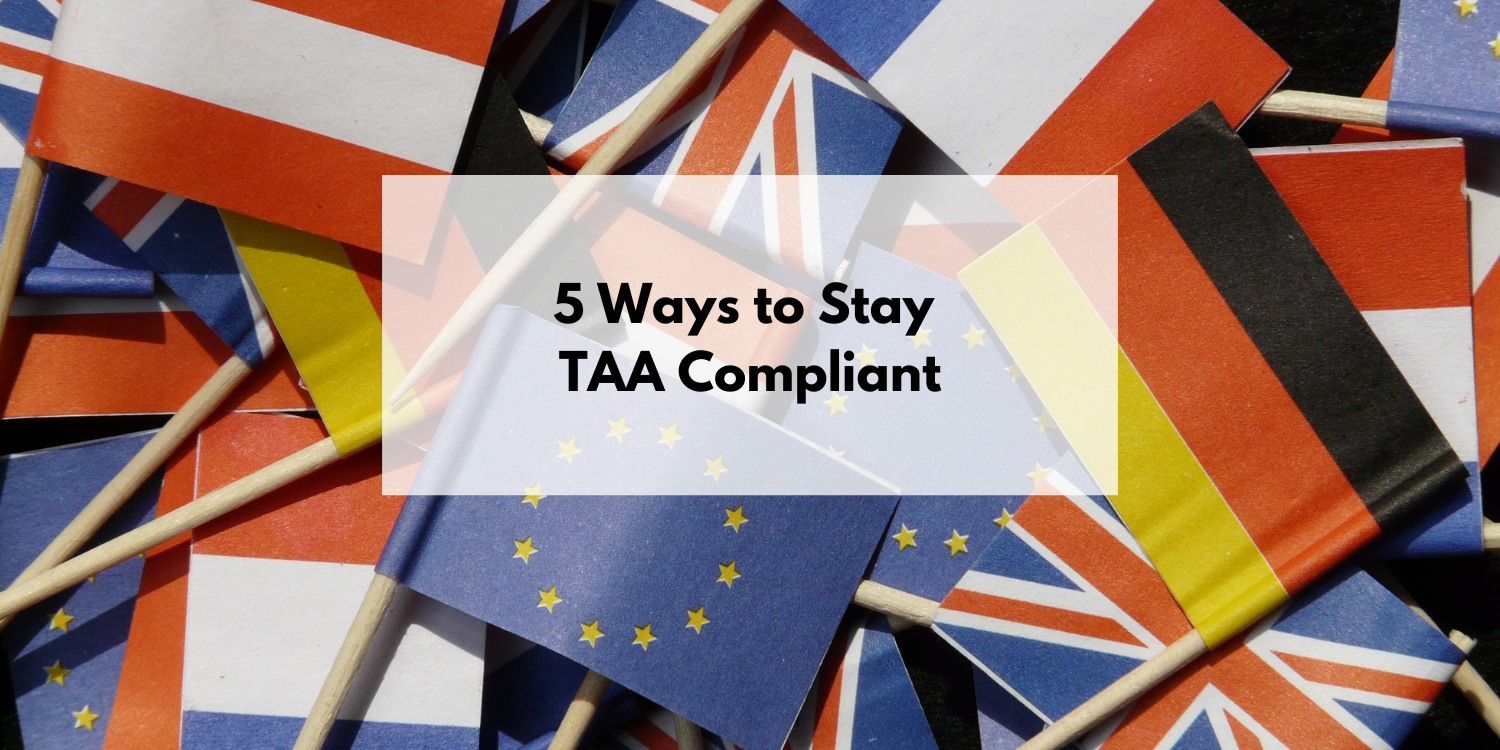5 Ways to Stay TAA Compliant
Government | Resources and Insight | 4 Min Read
Selling products and services to the U.S. government means adhering to several established rules and regulations. For potential and current GSA Schedule holders, complying with regulations outlined in the Trade Agreements Act (TAA) is one of the many requirements. While preparing an initial GSA Schedule proposal, most schedule holders become vaguely familiar with required trade laws and regulations. However, after their contract is awarded many make the mistake of not broadening their understanding and fail to regularly monitor their contract to maintain TAA compliant. In this blog, we will define what TAA compliance means and discuss 5 ways to stay TAA compliant.
What Does TAA Compliance mean?
TAA compliance can be defined as ensuring that products being sold to the U.S. government are manufactured or substantially transformed in the United States or a TAA-designated country. According to GSA, for a product to be substantially transformed, it means that the product has become a new and different commerce article in terms of name, character, or use. This prohibits Schedule holders from selling products made in countries excluded from the free trade agreement.
Examples of countries that are not TAA compliant include but are not limited to China, Russia, Iran, Pakistan, Brazil, and Malaysia.
Countries that are TAA compliant are included in the following categories:
- World Trade Organization Government Procurement Agreement Countries
- Free Trade Agreement Countries
- Least Developed Countries
- Caribbean Basin Countries
A full list of the countries included within these categories can be found in Federal Acquisition Regulation (FAR) 52.225-5 on trade agreements. If a GSA contractor does not adhere to this requirement, they may face financial and legal consequences.
Remaining compliant with TAA may prove challenging, but there are some tips and trips you can implement to successfully navigate this regulation.
5 Ways to Stay TAA Compliant
Since you can hold your GSA Schedule contract for up to 20 years, that’s a lot of time to monitor your products and services. Especially since during this time you may have a change in manufacturers for a whole product or certain parts, or you may introduce totally new products. It’s important you stay vigilant about meeting TAA compliance throughout the 20-year period. So, here are 5 ways you can remain TAA compliant:
1. Create a Compliance Agreement Between Supplier and Manufacturer
Create a compliance agreement that contains a detailed checklist for TAA requirements and requires notice of changes that can affect compliance status. Some language for this agreement is already included in the Letter of Supply so you have a head start. This will ensure both parties are aware of the requirements and the right team is notified when there is a significant change in production, eliminating blind spots and gaps.
2. Develop TAA Compliance Training
TAA compliance is not something that is self-explanatory—each Schedule holder should have written policies and procedures that promote employee awareness and prevent any violation of the TAA. This should include training that covers every facet of TAA compliance. While this may seem tedious, it really helps to have multiple people on your team aware of the regulations. That way the weight of compliance isn’t resting on one person.
3. Maintain a Detailed Inventory
Maintain detailed records of manufacturer/supplier information. This should include confirming the point of production for each product, and conducting routine audits to ensure the countries of origin listed for each product are accurate. Sometimes manufacturers change their point of production so even if a product fulfills TAA compliance rules initially, it may fail to meet TAA requirements in the future.
An accurate inventory helps contractors keep track of where their products are being sourced and streamlines the process of validating suppliers’ compliance with the TAA.
4. Conduct Contract Maintenance
While some Schedule holders may keep accurate records within their companies, failure to submit modifications if products on scheduling are no longer TAA compliant
5. Ask for Help when You Need it
When you have done thorough research but can’t grasp the requirements you should meet to stay TAA compliant, seek guidance. If TAA compliance seems like a foreign concept that you do not understand, getting assistance and/or advice from professional experts can resolve any issues of non-compliance.
For Schedule holders that use materials outside the U.S. to manufacture and develop their products, these tips can prevent issues of non-compliance with the TAA. For additional assistance, check out this blog to learn how Advisory Rulings can help you remain in compliance.
Understanding the Importance of TAA Compliance
Being TAA compliant demonstrates your company operates ethically and responsibly. This is why TAA compliance is a critical part of contract maintenance. In light of recent events, this requirement has become more strictly enforced. This past fall, GSA had already begun the process of Removing Non-Compliant Products from MAS Contracts and GSA Advantage!
The process for maintaining compliance can be time-consuming, but failure to comply can lead to serious repercussions such as fines and contract termination. That is why we are here to help. From current GSA contractors adding new products to those getting a GSA schedule, TAA compliance is a common area of concern for our clients. Winvale has assisted several of our clients with TAA and other compliance measures and would be happy to help answer any questions you may have. Subscribe to our blog to stay informed and up to date about the latest compliance regulations.






